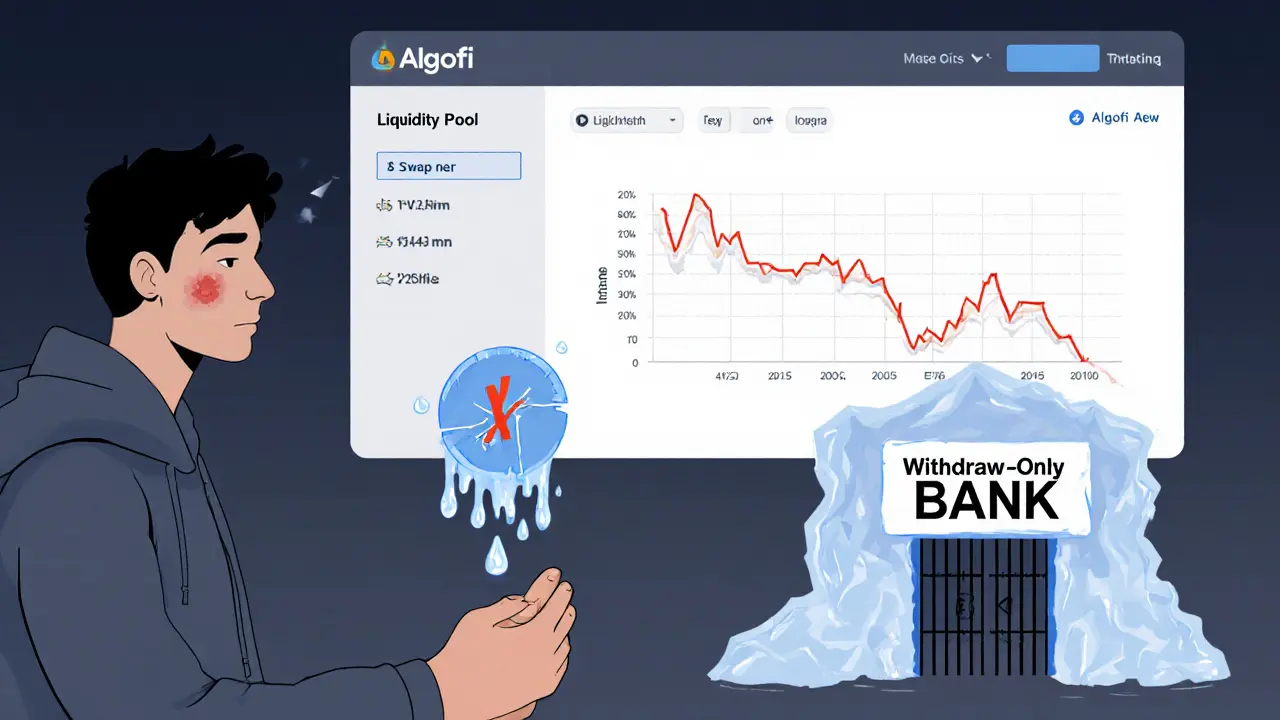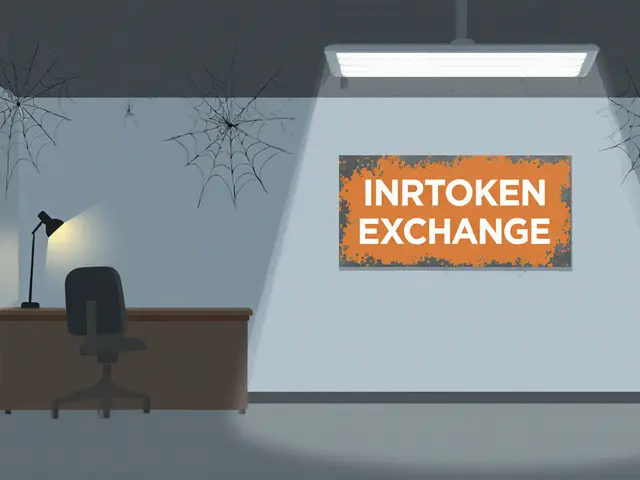Algorand DEX Comparison Tool
This tool helps you compare the most important metrics for Algorand's major decentralized exchanges. Based on historical data from the article, see how Algofi, Tinyman, and Pact measured up in key areas when Algofi was operational.
Key Comparison Metrics
These metrics reflect the state of each platform in 2023-2024 when Algofi was still operational.
Tinyman: $12M
Pact: $8M
Tinyman: $1.2M
Pact: $900k
Tinyman: 12+ pools
Pact: 9 pools
Tinyman: Active, monthly votes
Pact: Active, quarterly votes
Tinyman: Pera, MyAlgo, Ledger
Pact: Pera, MyAlgo
What These Metrics Mean for You
When choosing a DEX on Algorand, these metrics directly impact your trading experience:
- TVL (Total Value Locked): Higher values often indicate more stable trading pairs and lower slippage.
- Swap Volume: Higher volume means better liquidity and more reliable trades.
- Liquidity Pools: More pools mean more trading pairs available with better pricing.
- Governance Activity: Active governance means ongoing protocol improvements and development.
- Wallet Integration: Broader wallet support makes it easier to connect and use the platform.
Based on this data, Tinyman appears to be the most robust Algorand DEX in terms of active trading volume and liquidity, while Algofi's historical TVL data shows its peak dominance was temporary.
Supported Tokens
The following tokens were supported on Algofi at its peak:
When you hear "Algofi," the first thought is often a one‑stop DeFi hub on the Algorand blockchain. Launched in December 2021, it promised lending, borrowing, a native stablecoin and a decentralized exchange (DEX) all under a single roof. Fast‑forward to 2025, and the story has taken a sharp turn - a shutdown, a rumor of a reboot, and a mixed bag of user experiences. This Algofi review breaks down what the platform delivered, why it stalled, and whether any revival is realistic.
What is Algofi?
Algofi is a DeFi protocol built on the Algorand blockchain that combined lending, borrowing, stablecoin issuance (STBL), governance (BANK token) and a DEX. It positioned itself as Algorand’s flagship DeFi ecosystem, aiming to attract both retail users and developers looking for high‑throughput, low‑fee transactions.
The platform required only an Algorand‑compatible wallet - mostly Pera wallet or MyAlgo wallet - eliminating traditional sign‑up steps. Users could connect, lend assets, mint the STBL stablecoin, or swap tokens directly from their browser.
Key Features and How They Worked
- Lending & Borrowing: Supported ALGO, vALGO, STBL, USDC, goBTC and goETH. Collateral factors ranged from 80% at launch to 0% during the wind‑down.
- STBL Stablecoin: Algofi's algorithmic stablecoin pegged to the US dollar, minted by locking collateral in vaults.
- BANK Governance Token: Holders could vote on protocol upgrades and claim airdrops. BANK token served as the DAO’s decision‑making unit.
- Decentralized Exchange: An Automated Market Maker (AMM) that let users swap supported assets without a central order book.
- Account‑less Access: No KYC or email registration; just a wallet connect.
Performance Metrics - The Numbers Tell a Story
At its peak in February 2023, Algofi locked $134.7 million across its services, accounting for roughly 54% of Algorand’s total DeFi value‑locked (TVL) according to DeFiLlama data. By July 2023, TVL had slumped to $25 million - an 81.5% drop in just five months.
Swap activity was even more stark. Independent tracking showed 24‑hour DEX volume hovering near zero, often recorded as "effectively zero" for extended periods. Liquidity pools remained shallow, meaning most trades failed to execute or suffered massive slippage.
Security‑wise, Algofi inherited Algorand’s Pure Proof‑of‑Stake (PPoS) consensus, which offers fast finality and low fees. However, with negligible trading volume, the DEX component never faced real‑world stress tests, leaving its practical security largely theoretical.
Why Did Algofi Shut Down?
The July 2023 announcement detailed a step‑by‑step wind‑down:
- All governance proposals frozen.
- Collateral factors for every market reduced from ~80% to 0% between September and December 2023.
- Liquidity programs halted, leaving the AMM without depth.
- Users entered "withdraw‑only mode" to retrieve assets.
Analysts point to three core reasons:
- Liquidity Crisis: Without sufficient pools, swaps couldn’t fill, yielding zero fees for liquidity providers.
- Fragmented Ecosystem: Competing Algorand DEXs like Tinyman and Pact attracted the few active traders, leaving Algofi under‑utilized.
- Market Conditions: The broader crypto downturn in 2022‑2023 reduced new capital inflows to DeFi projects across the board.
Comparing Algofi to Other Algorand DEXs
| Metric | Algofi | Tinyman | Pact |
|---|---|---|---|
| Total Value Locked (TVL) | $25 M (July 2023) | $12 M | $8 M |
| 24‑hr Swap Volume | ≈$0 (effectively zero) | $1.2 M | $900 k |
| Active Liquidity Pools | 3 major pools | 12+ pools | 9 pools |
| Governance Activity (proposals) | Frozen post‑July 2023 | Active, monthly votes | Active, quarterly votes |
| User On‑ramp (wallet integration) | Pera, MyAlgo only | Pera, MyAlgo, Ledger | Pera, MyAlgo |
The table highlights that while Algofi once dominated TVL, its actual trading activity lagged far behind the specialized DEXs. Tinyman’s broader pool count and steady swap volume made it the go‑to platform for Algorand traders.

User Experience - What Did Real Users Say?
Community chatter on Reddit and Discord painted a clear picture: users loved the account‑less design, but the lack of depth meant swaps failed or executed at terrible rates. A common complaint was “I connected my MyAlgo wallet, tried swapping ALGO for STBL, and the transaction never filled.”
Early adopters who had staked BANK tokens lamented the abrupt governance freeze, which left them unable to vote on proposals or claim promised airdrops. The swift wind‑down, however, did allow users to withdraw their assets without major hiccups - a silver lining that prevented loss of funds.
Is a Revival Possible?
In August 2025, a speculative report suggested a “recent liquidity injection” could spark an Algofi reboot. While the claim is upbeat, the practical hurdles remain steep:
- Re‑establishing deep liquidity pools would require sizable capital from yield farms or institutional backers.
- Competing DEXs have already cemented user habits, making user acquisition costly.
- Regulatory scrutiny on DeFi protocols has intensified, especially around stablecoin issuance (STBL).
Until these challenges are addressed, the most realistic outlook is that Algofi will stay dormant or be repurposed under a different brand.
Bottom Line - Should You Care About Algofi in 2025?
If you’re hunting for a vibrant Algorand DEX, Tinyman or Pact are the safer bets. Algofi’s historical significance - once holding more than half of Algorand’s DeFi TVL - makes it an interesting case study, but its practical utility today is limited. Keep an eye on any official announcements, but allocate capital elsewhere until a clear, funded revival plan emerges.
What assets could I trade on Algofi?
Algofi supported ALGO, vALGO (wrapped ALGO), STBL (its native stablecoin), USDC, goBTC and goETH. Users could also lend and borrow these assets through the protocol’s vaults.

Do I need to complete KYC to use Algofi?
No. Algofi was built as an account‑less DeFi platform. All you needed was a compatible Algorand wallet like Pera or MyAlgo.
Why was the swap volume on Algofi so low?
Liquidity pools never reached sufficient depth. Without enough tokens in the pool, trades either failed to execute or suffered extreme slippage, discouraging traders from using the DEX.
Can I still withdraw assets from Algofi?
Yes. The protocol entered a withdrawal‑only mode in 2023, allowing users to pull their funds back to their wallets. The process was designed to be frictionless.
Is there any chance Algofi will relaunch?
Speculative reports in 2025 hinted at a potential liquidity injection, but no concrete roadmap or funding has been announced. Until then, a relaunch remains uncertain.




Comments (8)